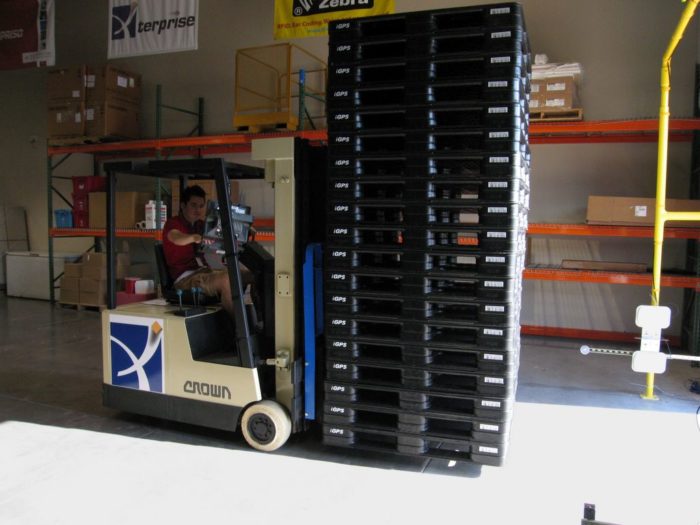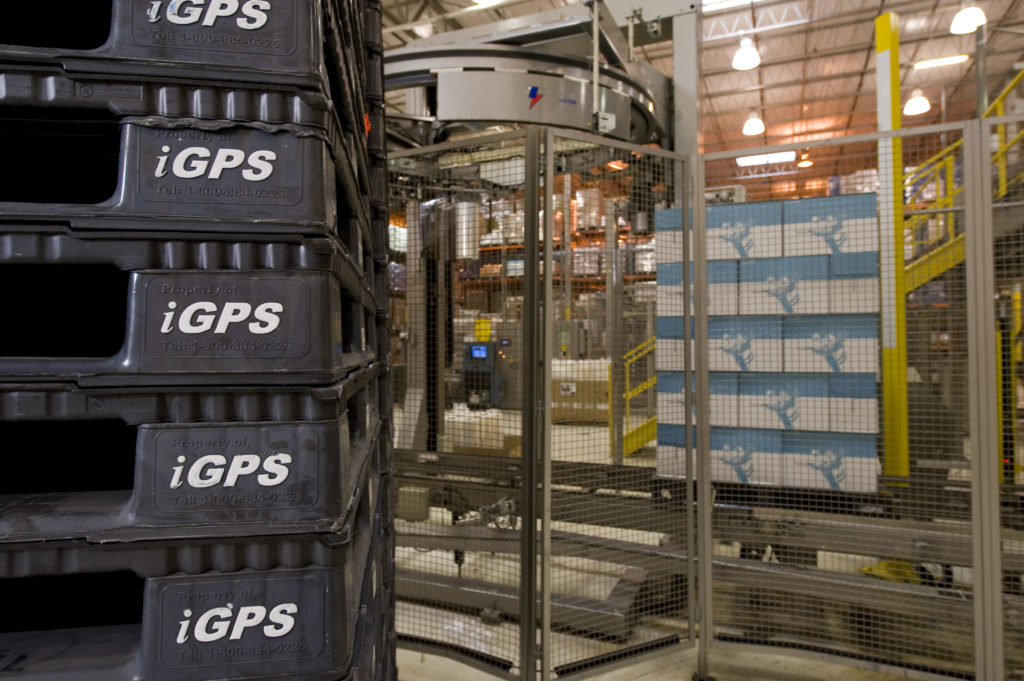Because of its strength, durability, and resistance to liquids, a plastic pallet’s lifespan can be more than double that of its wood counterpart–up to ten years, depending on how it’s maintained, the weight it carries, and how often it’s used, among other factors. Often, the superior longevity of plastic pallets is what drives supply chain managers to choose them, but there’s a lot more to consider in comparing wood versus plastic pallets. Plastic pallets can help support circular business models where even retired pallets become useful again through recycling.
It’s also important to keep in mind that although the lifespan of a plastic pallet can be measured in years, this isn’t the best way to think about pallet longevity. An even more important consideration for warehouse and supply chain managers is the number of trips a pallet can make. When built using high-density polyethylene and when used in optimal conditions, quality plastic pallets can make as many as 100 trips through the supply chain, though repairs might be necessary. The lifespan of a wood pallet, meanwhile, is typically much shorter; wood pallets will last for a maximum of 15 to 20 trips, with significant repairs required after every three or four.
Factors That Influence the Lifespan of a Pallet
 While it’s possible to estimate how long a pallet will last, like any piece of equipment, a pallet’s lifespan will vary depending on how it’s treated and the conditions it experiences. The factors that impact a pallet’s lifespan include:
While it’s possible to estimate how long a pallet will last, like any piece of equipment, a pallet’s lifespan will vary depending on how it’s treated and the conditions it experiences. The factors that impact a pallet’s lifespan include:
| Wood | Plastic | |
| Environmental Factors | When stored in damp environments, wood pallets may degrade and become easily broken due to moisture and mold. This can cause them to break down sooner than anticipated. | Plastic pallets are not porous, making them immune to the damage moisture can cause, such as mold and rot. |
| Handling | Wood pallets are on average about 27 pounds heavier than plastic counterparts. As a result, employees may have more difficulty lifting and moving them, resulting in rough handling that may damage the pallets. | Plastic platforms weigh less than standard wood pallets and have built-in ergonomic handholds. This makes them easier to handle, so rough handling is less frequent and damage less likely. |
| Frequency and Type of Use | The more a pallet is used, the faster it will break down. In particular, when used in conjunction with automated machinery and equipment, wooden pallets tend to splinter and crack, which shortens their useful lifespan. | Plastic pallets are also impacted by frequent use, but less so than wood, as they don’t splinter and will bend before they break. Plastic pallets are typically recommended for use with automated equipment as they’re durable, consistent, and less prone to breakage. |
| Hygiene | The porousness of wood makes hygiene a problem, as bacteria can multiply in these pores and become difficult to clean. Those issues can spread to the product load, making the pallets unsuitable for continued use. | Like any surface, plastic can also carry bacteria, but as it’s not porous, plastic is easy to wipe or spray clean. Plastic can also be sanitized or pressure-washed to remove contaminants. |
| Hardware Breakdown | The nails and screws used to assemble wood pallets can rust or come loose. As these pieces are critical to structural integrity, the pallet will require repair before it can be used again. | High-quality plastic pallets typically have a unibody construction, meaning there are no metal components or nails to worry about. As such, hardware breakdown is a non-issue. |
Another factor managers should consider when thinking about lifespan is what happens to a pallet at the end of its useful life.
How Pallet Pooling Extends a Plastic Pallet’s Lifespan
 Plastic isn’t typically synonymous with sustainability, as many people hear the word and picture plastic bags lying in landfills. However, when it comes to pallets, plastic can be part of a sustainable life cycle. High-quality plastic pallets managed by a pallet pooling company are considered valuable assets. While wood pallets will generally end up in a landfill at the end of their useful lives, pooled plastic pallets are ground down and used to create new pallets that are used again and again as part of a closed loop supply chain system. For this reason, plastic pallets support the circular business model by keeping resources inside the supply chain.
Plastic isn’t typically synonymous with sustainability, as many people hear the word and picture plastic bags lying in landfills. However, when it comes to pallets, plastic can be part of a sustainable life cycle. High-quality plastic pallets managed by a pallet pooling company are considered valuable assets. While wood pallets will generally end up in a landfill at the end of their useful lives, pooled plastic pallets are ground down and used to create new pallets that are used again and again as part of a closed loop supply chain system. For this reason, plastic pallets support the circular business model by keeping resources inside the supply chain.
Pallet pooling is the best way to make the most of a plastic pallet’s lifespan. It’s also the most cost-effective way to manage a pallet fleet. Pooling allows businesses to rent pallets rather than buy them outright, putting pallet repair and maintenance in the hands of the pallet pooling provider. Pooling services recycle and replace plastic pallets when they come to the end of their useful life and also manage pallet resources to ensure companies have the fit-for-use pallets they need, when they need them. Plastic pallet pooling leverages the durability of plastic through reuse and allows your company to focus on its core business.
iGPS pallet pooling provides your business with durable, hygienic plastic platforms while handling pallet maintenance and repairs so that you can concentrate on productivity. To learn more about how iGPS pallets are the sustainable, smart option for your supply chain, contact us at 1-800-884-0225, email a specialist at switch@igps.net, or visit our contact page.



